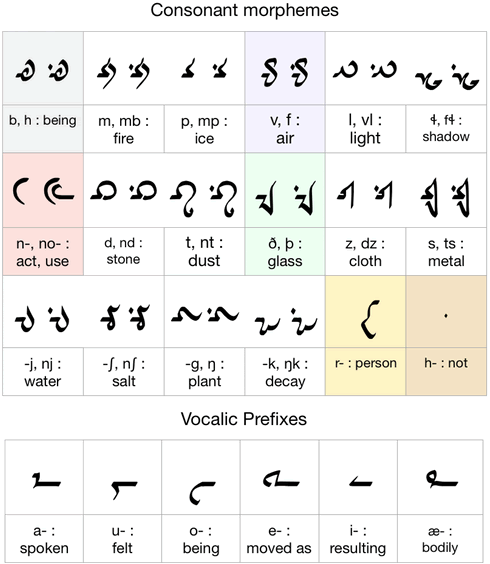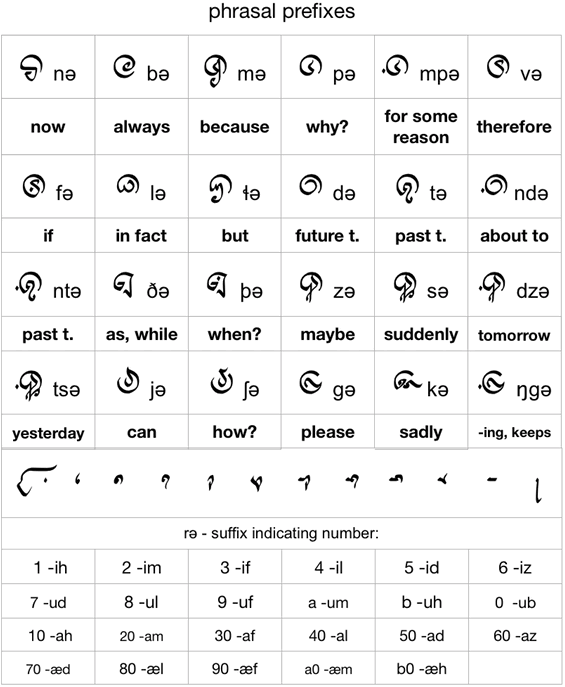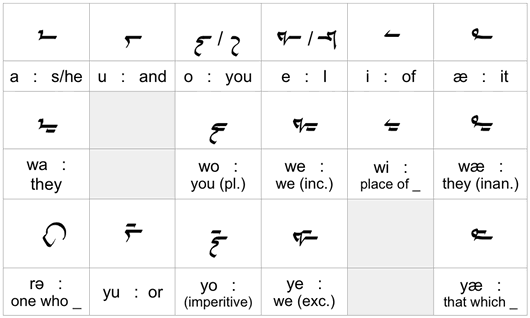
Yufrabiz is a language and script that was created by Max Greiner in 2024.

Yufrabiz is the culmination of 15 years of attempting to build, for lack of an established term, a yevlekyuf, or "tightly plotted language," as inspired by Samuel Delaney's concept of Babel 17. (Yufrabiz just means "Language 18" in homage to the inspiration). In such a language, each morpheme should monopolize a single concept and only that concept, and morphemes should be as small, efficient, and consistent as possible. This, in theory, adds to learnability, efficiency, and clarity - though for practical reasons this is extremely difficult to prove.
If, for example, the root morpheme -m means "heat", all syllables and only syllables semantically and morphologically linked to the concept of heat should include the sound m. I've added a constraint that a voiceless counterpart with similar placement (in this case -p) should carry the opposite meaning "cold". To make this feasible, accompanying vowels are used before morpheme consonants to== indicate the sense of artistic license or extended metaphor with which the paired morphemes ("heat/cold" in this case) should be interpreted. This vowel-consonant construction is the basis for all adjectives, adverbs, and postpositions (used interchangeably) in the language:
| am - spoken with fire/heat: | friendly | ap - spoken with ice: | angry |
| um - feeling akin to fire/heat: | happy | up - feeling akin to ice/cold: | sad |
| om - being like heat/fire: | hot | op - being like ice: | cold |
| em - motion/direction of heat: | into | em - motion/direction of cold: | out of |
| im - a result of heat: | lightweight | ip - a result of ice/cold: | heavy |
| æm - pertaining to the body/life: | enough | æp - pertaining to the body/life: | almost |
A series of consonant clusters closely related to the root morphemes (in this instance -mb/-mp) act as intensified versions of the above sets for more shades of meaning. They tend to be a shade more long-term, physical, or visible:
| amb - exclaimed with fire/heat: | amazing | amp - exclaimed with ice: | cruel |
| umb - feeling too much fire/heat: | obsessed | ump - feeling too much ice/cold: | bitter |
| omb - being like/affected by fire: | sticky | omp - being like/affected by ice: | smooth |
| emb - motion/appearance of heat: | red | emp - motion/appearance of cold: | cyan |
| imb - a result of more heat: | successful | imp - a result of more ice/cold: | defeated |
| æmb - impinging on the body/life: | excessive | æmp - impinging on the body/life: | insufficient |
Syllable initial markers n-, r-, w-, and y-, which don't carry intrinsic meaning like m or p, are added to the simple adjective forms for inflection, which is the basis for all nouns and verbs in the language:
| em - motion/direction of heat: | into | ep - motion/direction of cold: | out of |
| nem - to go with/like heat: | v. to enter, arrive | nep - to move with/like cold: | v. to exit, leave |
| rem - one who has entered: | n. guest, visitor | rep - one from outside: | n. alien |
| wem - a warm place one enters: | n. room | wep - the cold place outside: | n. space, universe |
| yem - an object of/for heat: | n. spark | yep - the object heat has left: | n. ash, carbon |
The same, in intensified form:
| emb - motion/appearance of heat: | red | emp - motion/appearance of cold: | cyan |
| nemb - to push with/like heat: | v. to send, drive | nemp - to push with/like cold: | v. to block, clog |
| remb - one who sends, drives: | n. pilot | remp - one who blocks: | n. guard, sentry |
| wemb - place on which one drives: | n. bridge | wemp - place that blocks driving: | n. wall |
| yemb - that which is driven, sent: | n. vehicle | yemp - object that prevents driving: | n. wedge, break |
Tense, interrogatives, some adverbs, and various other verb mode/aspect features are handled using a novel part of speech called phrasal prefixes (PP; marked interchangeably with -ǝ or -'), each somewhat mnemonically linked to the consonant morpheme's meaning. Some examples:

Negative argument is always indicated by a pre-pronominal h-. Using these prefixes anywhere besides the beginning of a sentence is possible but done judiciously. However, they can often stack:
ɬǝt'nǝkǝmp' hænembæ
"but unfortunately for some reason it kept not sending it."
Also, unlike typical tense or aspect markers, these continue to apply for as long as the speaker continues or until another occurs. A story all in past tense requires only tǝ at the beginning, until for instance, someone in the story speaks in future tense, then the tense of the story should be reestablished in the next sentence.
Finally, all pronouns as well as some modifiers, articles, and plurality are handled by vowels:

This setup is central for disambiguation paired with a strict word order:
PP + Subject NP (subjunctive + noun + adj.) + VP (S. pronoun + verb + adv. + O. pronoun) + Object NP
Under this structure, particularly with vocalic pronouns sandwiching verb phrases, the correct parsing should always be evident, and there should be minimal chance of misparsing phrases (which is of heightened importance in yevlekyuf because the phrases are so condensed that a small misparse can have catastrophic effects on comprehension). Phrases can also be strung together in compounds without additional inflection. In practice:

As mentioned above, since n-, r-, w-, and y- don't hold any intrinsic meaning beyond indicating part of speech and initiating phrases, compounds such as (a)-naf-yo-nem-e-niz-o ("she says, you, enter! I give you") can only be parsed in one meaningful way, minimizing ambiguity. For that reason, to heighten clarity and efficiency without introducing ambiguity, there are some legal clitics with a (when it's a pronoun) and with æ.
e-i-æ ænæbæ imb-i-æ ("my one is the red one") is technically correct and acceptable, but can be spoken as einbimb ("mine's red").
The full chart of the language, ordered by vowel and morpheme, along with other resources including font and translations, can be found in this google folder: https://drive.google.com/drive/folders/1cKohov2M8UgxdjI7RiJmdME5ixFJGQTM?usp=sharing

All human beings are born free and equal in dignity and rights. They are endowed with reason and conscience and should act towards one another in a spirit of brotherhood.
(Article 1 of the Universal Declaration of Human Rights)
Also by Max Greiner: Nalozeþ fæza
Constructed scripts for: Ainu | Arabic | Chinese languages | Dutch | English | Hawaiian | Hungarian | Japanese | Korean | Lingala | Malay & Indonesian | Persian | Tagalog / Filipino | Russian | Sanskrit | Spanish | Taino | Turkish | Vietnamese | Welsh | Other natural languages | Colour-based scripts | Tactile scripts | Phonetic/universal scripts | Constructed scripts for constructed languages | Adaptations of existing alphabets | Fictional alphabets | Magical alphabets | A-Z index | How to submit a constructed script
[top]
You can support this site by Buying Me A Coffee, and if you like what you see on this page, you can use the buttons below to share it with people you know.

If you like this site and find it useful, you can support it by making a donation via PayPal or Patreon, or by contributing in other ways. Omniglot is how I make my living.
Note: all links on this site to Amazon.com, Amazon.co.uk
and Amazon.fr
are affiliate links. This means I earn a commission if you click on any of them and buy something. So by clicking on these links you can help to support this site.
[top]